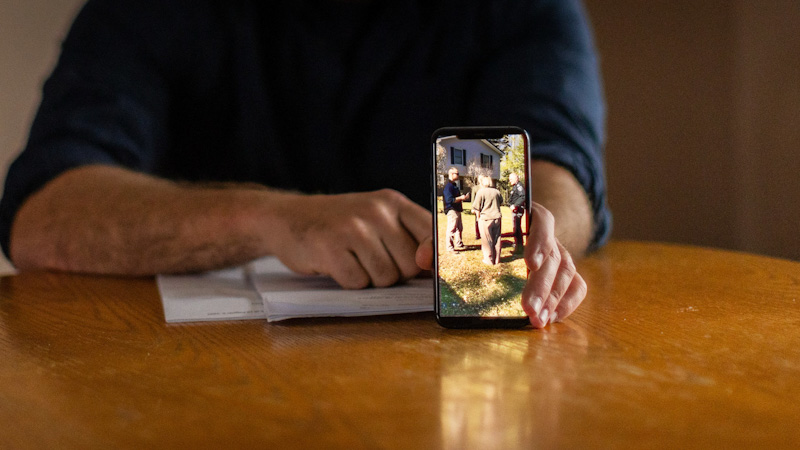Judges 'do not do double duty as sheriffs,' 4th Circuit says in denying judicial immunity for home search

A former family court in West Virginia had entered a man’s home over his objection and threatened him with arrest if he tried to stop her. She also noticed that she was being recorded, ordered a stop to it, and ordered the man to turn over his phone to the bailiff when he refused to comply. Photos from the Institute for Justice’s press release.
A West Virginia judge who led a warrantless search of a divorce litigant’s home is not entitled to judicial immunity because she engaged in a nonjudicial act, a federal appeals court ruled Monday.
The 4th U.S. Circuit Court of Appeals at Richmond, Virginia, ruled against former family court Judge Louise Goldston, who retired from the bench in January amid a bid to impeach her, according to a press release by the Institute for Justice, a post by the Legal Profession Blog, and stories by Law.com and Law360.
Goldston, a judge in Raleigh County, West Virginia, had searched the home of self-represented divorce litigant Matthew Gibson in March 2020 to look for marital property that he allegedly failed to turn over to his ex-wife. Afterward, Gibson sued Goldston for alleged violations of his constitutional rights.
 A judge in Raleigh County, West Virginia, had searched the home of self-represented divorce litigant Matthew Gibson in March 2020 to look for marital property that he allegedly failed to turn over to his ex-wife.
A judge in Raleigh County, West Virginia, had searched the home of self-represented divorce litigant Matthew Gibson in March 2020 to look for marital property that he allegedly failed to turn over to his ex-wife.
In its Oct. 30 opinion, the 4th Circuit said the search was a law-enforcement function that “clearly exceeded the most common understandings of the proper judicial role.” As a result, Goldston is not protected by judicial immunity in Gibson’s lawsuit.
Judges “do not do double duty as sheriffs,” the appeals court said in an opinion by Judge J. Harvie Wilkinson III, an appointee of former President Ronald Reagan.
Goldston had entered Gibson’s home over his objection and threatened him with arrest if he tried to stop her. She also noticed that she was being recorded, ordered a stop to it, and ordered Gibson to turn over his phone to the bailiff when he refused to comply.
The bailiff recorded the first part of the search for items that Gibson had not turned over to his ex-wife.
“The video painted a striking picture,” Wilkinson wrote.
“Judge Goldston, her list of unproduced assets in hand, directed proceedings,” telling the ex-wife to take photos hanging on the wall, yearbooks stashed in a closet and DVDs that she wanted that were stored downstairs. As the ex-wife sifted through the DVDs, Goldston “sat in a rocking chair, shoes off, supervising and giving orders,” Wilkinson said.
Goldston previously received a public censure for the incident, along with a $1,000 fine.
Gibson was represented by the Institute for Justice as part of its Project on Immunity and Accountability, which seeks to ensure that immunities don’t prevent people from vindicating their rights in court.
“Today is a victory not just for Matthew but for everyone who stands before a judge in a court of law and expects a fair hearing,” said Patrick Jaicomo, a senior attorney at the Institute for Justice, in the press release.
Write a letter to the editor, share a story tip or update, or report an error.



